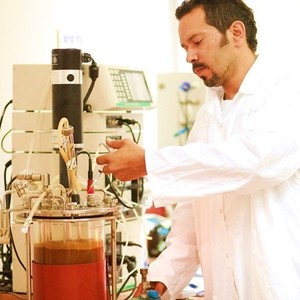NextFerm partners with Mascoma to produce new yeast strain

NextFerm Technologies
September 24, 2018
BY Matt Thompson
NextFerm, an Israeli company that produces fermentation products for the food and feed industries, is venturing into the ethanol industry by partnering with Mascoma LLC, a subsidiary of Lallemand Inc., a leading supplier of yeast to ethanol producers. NextFerm announced last week the signing of a joint development agreement with Mascoma.
Elzaphan Hotam, NexFerm’s vice president of global marketing and CEO of NextFerm Technologies USA, said the partnership is a natural one for both entities. “The relationship here, I would say, is exceptional to the business model that we intend to develop, which is to develop, produce and sell active ingredients. And for us, it was crucial to show that our methodology and technology work,” Hotam said.
NextFerm began in 2015 as a start-up that mainly focused on developing fermentation yeast for the food industry. Hotzam said many of NextFerm’s management team worked together at Enzymotec, which develops nutritional ingredients. “From the chairman to all the senior managers basically are veterans of that company in all categories, from basic R&D, to operational, to process development, myself included. So, it’s kind of a unique story.”
Advertisement
Advertisement
It’s that industry experience that helps NextFerm produce its yeast strains. The methods NextFerm uses to produce more robust forms of yeast are not new. “Roughly speaking, when you’re doing a breeding or you’re doing a selection, you use certain criteria to move from a generation to generation. The selection criteria are crucial. We apply, in a creative way, specific criteria that will help accelerate the process of evolution, so to speak,” Hotam said.
This process can be applied to many areas, including ethanol production, to develop yeast that is better able to cope with temperature or pH changes, for example. But the process used is not genetic modification, partially because the food industry is moving away from GMOs, but also because genetic modification is often too narrow for the type of strains NextFerm produces, Hotam said. “The advantage and disadvantage of using very directed, specific gene mutation is that it’s very, very narrow. You affect a specific gene or a specific sequence to fully improve it. When looking into resistance to environmental stressors, often it involves multiple genes rather than single genes. So, you need to look to other ways to breed, or other ways to improve (rather) than very pointed and directed.”
Advertisement
Advertisement
According to Hotam, NextFerm has begun the process of developing a new strain of yeast for Mascoma for use in the ethanol industry, although he isn’t sure how long that process will take or when it will be completed.
Of the partnership, Hotam said NextFerm is “very excited. We have high regards for their character and business etiquette. … We feel very privileged.”
That feeling is mutual, according to Kevin Wenger, executive vice president of Mascoma. “We’ve seen a high level of professionalism and experience coming from NextFerm which gives us tremendous confidence going forward,” he said.
Related Stories
The U.S. Energy Information Administration maintained its forecast for 2025 and 2026 biodiesel, renewable diesel and sustainable aviation fuel (SAF) production in its latest Short-Term Energy Outlook, released July 8.
XCF Global Inc. on July 10 shared its strategic plan to invest close to $1 billion in developing a network of SAF production facilities, expanding its U.S. footprint, and advancing its international growth strategy.
U.S. fuel ethanol capacity fell slightly in April, while biodiesel and renewable diesel capacity held steady, according to data released by the U.S. EIA on June 30. Feedstock consumption was down when compared to the previous month.
XCF Global Inc. on July 8 provided a production update on its flagship New Rise Reno facility, underscoring that the plant has successfully produced SAF, renewable diesel, and renewable naphtha during its initial ramp-up.
The USDA’s Risk Management Agency is implementing multiple changes to the Camelina pilot insurance program for the 2026 and succeeding crop years. The changes will expand coverage options and provide greater flexibility for producers.
Upcoming Events










